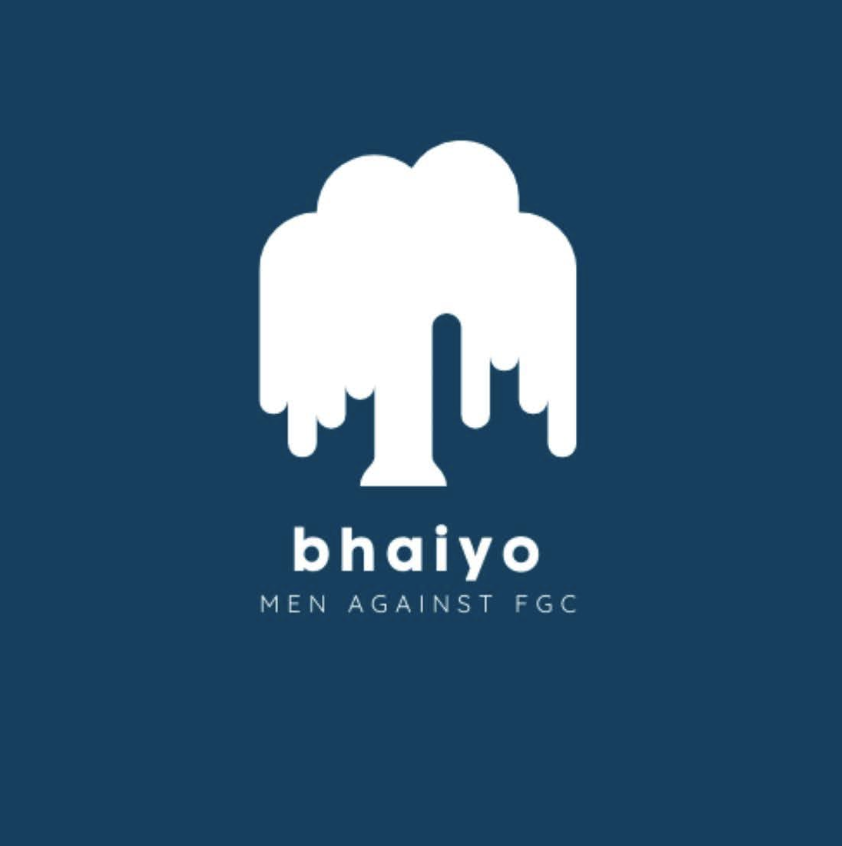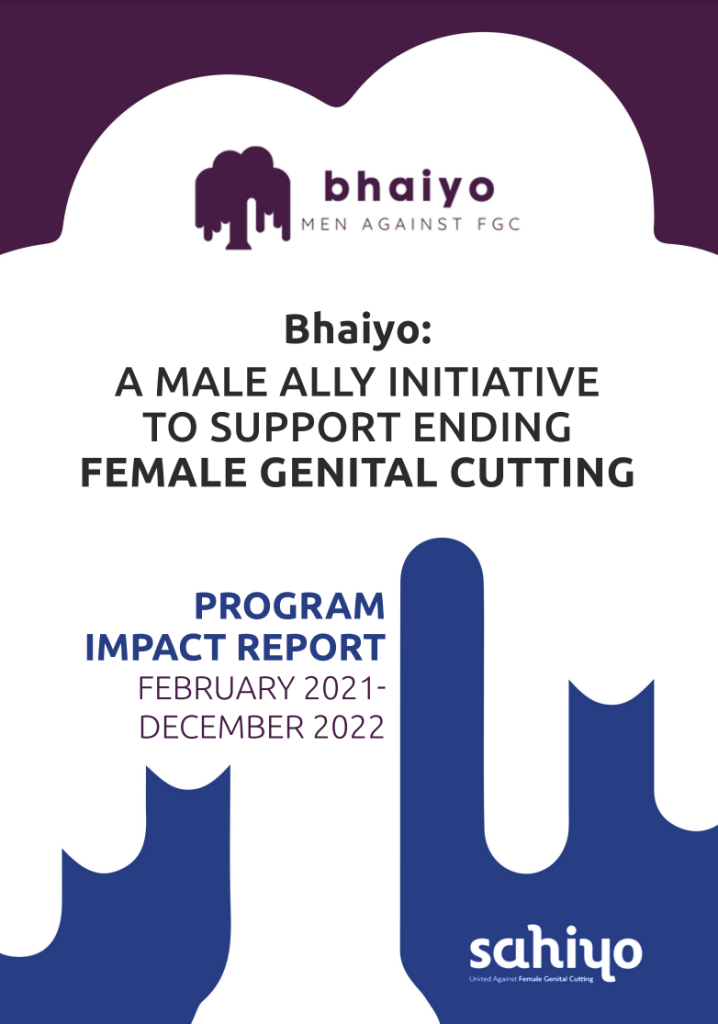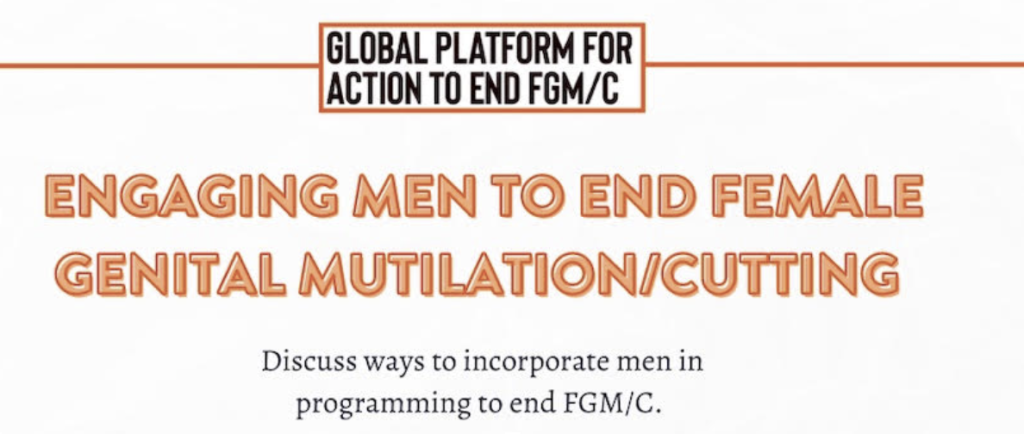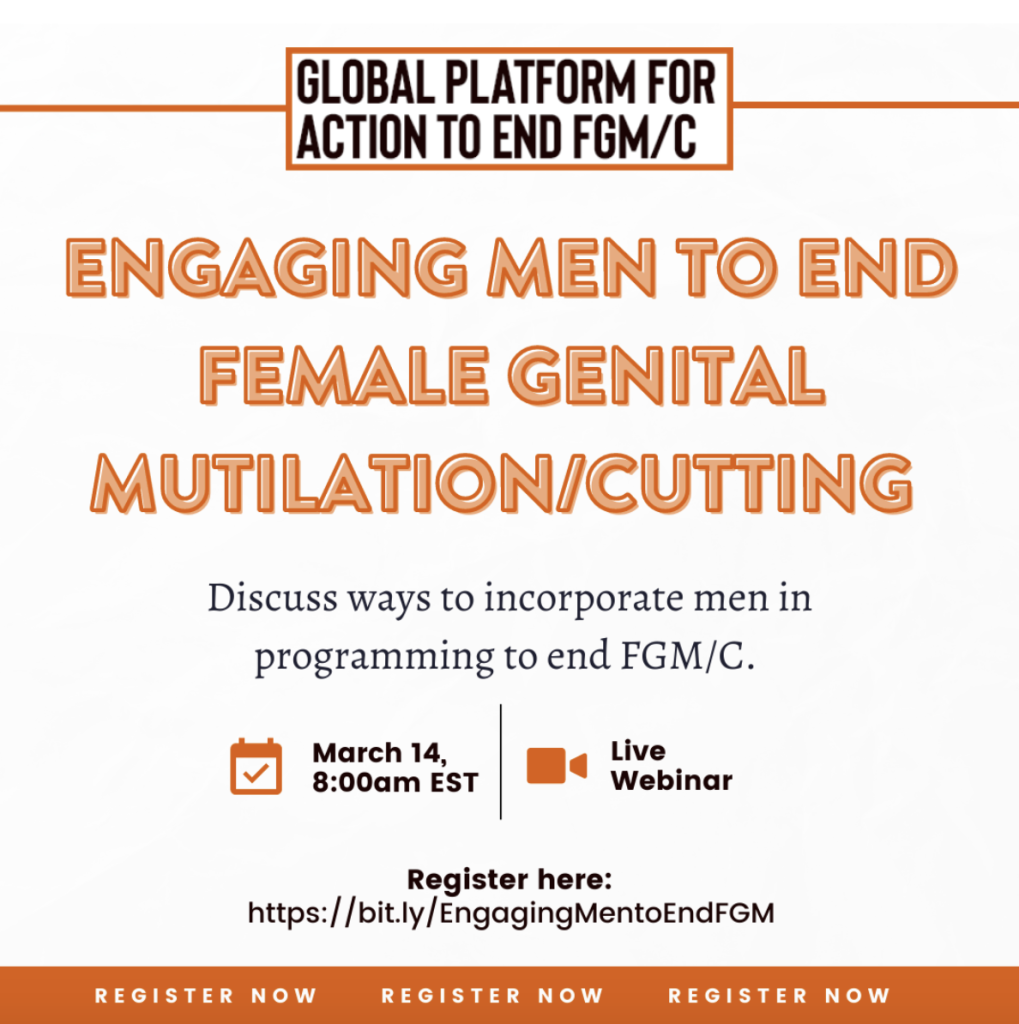Positive Masculinity; A Critical Tool in the Movement to End FGM/C

By Brad Mazon, PhD. Brad is a Bhaiyo volunteer, nonprofit consultant, husband, father, and an advocate against female genital mutilation/cutting worldwide. I had the opportunity to attend two webinars sponsored by the Men End FGM Foundation entitled “Power of Prevention: Harnessing Positive Masculinity to Combat Violence Against Women and Girls.” The title of the webinar itself indicates that masculinity, and its implementation, can be negative or toxic. During the webinar, I almost came to think of “masculinity” as a verb, given its ability to exert either a positive or negative influence on the lives of others. The term “toxic masculinity” was mentioned throughout the webinar, as folks chimed in about the need to redefine masculinity. Toxic masculinity is the idea that to be masculine is to be inherently oppressive and controlling. “Positive masculinity” was another frequently invoked term, defined as being empathic, emotionally intelligent, and honest with one’s feelings. Toxic masculinity not only affects women but men as well. Think of all of the ways that men suffer from toxic masculinity, including how it defines their life choices, decisions about a mate, how they interact with all genders, how they dress, the music they listen to or not, whether they cry or not, and even how they perceive themselves. As a gay man, I’ve recognized how American society’s notion of masculinity has influenced my path. The webinar reinforced, yet again, how masculinity is defined directly impacts all people, no matter what your gender is. Dr. Jacqueline Chesang spoke of how it takes years to change social and gender norms. She emphasized that a whole community approach is needed so that the perspectives of men and boys are included because men can also be barriers to change if you don’t engage with them. Dr. Chesang continued by saying that men can advocate and act as role models for anti-GBV efforts and that they can share stories of standing up to norms that harm women. Dr. Chesang also emphasized that we must not exclude men in the work to end gender-based violence. If we do, the existing discriminatory power structure will be reinforced. It made me reflect upon my Midwest fraternity days, when “little sister” parties were held with nearby sororities, but had nothing to do with being “big brothers,” and everything to do with consuming alcohol and hooking up. I’ve seen positive shifts in gender norms over time, but I also know that patriarchy continues to influence women and girls in ways that even they have assumed are “normal” or “acceptable.” Dr. Patrick Muia Ndavi, the Coordinator for Abandonment of FGM for the Africa Center in the Department of Obstetrics at the University of Nairobi, talked about how important it is to understand power dynamics when discussing FGC. He said that a charismatic village elder is needed to help to promote gender equality. Dr. Ndavi addressed various types of power, including skill or expert power, charismatic power, coercive power, and informational power, asking the following questions for us to reflect upon: What is the broader context of power dynamics in the community? Whose opinion matters to everyone in the community? Where does violence manifest itself in the community? Data is needed, he said, to develop and implement strategies to harness male decision-makers to become champions for women and girls. I asked myself where positive masculinity begins. Does it start at home, as one speaker advocated for, at school, or in the media? We are inundated with examples of toxic masculinity, even to the point of admiring the most toxic behaviors in our celebrities, business leaders, tribal elders, and politicians. How can we as societies see beyond gender stereotypes so we can build communities that respect everyone’s contributions, regardless of gender? As the speakers indicated, we have to adopt a multisectoral approach to tackle gender-based violence. The media needs to be engaged to help shape perceptions of masculinity. We can start by teaching boys and girls about gender equality and modeling respectful power dynamics at home. Thinking outside of accepted gender norms takes creativity, the willingness to change, and courage, particularly at the most personal level. Sometimes for change to occur, it also takes an external agent (i.e. legal mechanisms), as we saw recently in The Gambia. To me, positive masculinity is about recognizing and acting on gender equality and respecting the human rights of all in a way that leaves the old, tired, and toxic ways in the dust. Men and women should be equally engaged in this journey. When that happens, there is nothing that we can’t do together to end FGM/C and stop gender-based violence.
Reflecting on Our Father’s Day Bhaiyo Campaign

We would like to thank all of those who participated in our public awareness campaign surrounding male engagement in the movement against FGC. In honor of Father’s Day 2024, Sahiyo’s male engagement program, Bhaiyo, launched a campaign to help survivors and activists have productive conversations with the men in their lives about FGC. Throughout June and into July, we shared videos, quotes and articles on our social media platforms and blog, highlighting how men can raise awareness about FGC and voicing their support for ending the practice. We encourage you to take a look at the inspiring blogs and posts that were published throughout this campaign: Breaking the Silence: A Conversation with My Father About FGM/C The practice of khatna on girls must stop / છોકરીઓ પર ખત્નાની પ્રથા બંધ થવી જોઈએ Starting the Dialogue: Sharing Your Experiences on Initiating Conversations with Men about Female Genital Cutting Ending FGM – Fight the Mansplaining, Toxic Masculinity, and Patriarchy To view the social media posts from this campaign please visit our Instagram page @sahiyovoices. Once again we would like to thank all of those who participated in the campaign, your efforts to engage in difficult, thought provoking, and important conversations with the men in your lives is crucial in the movement to end FGC. To learn more about Sahiyo’s male engagement program, Bhaiyo, click here. /images/bhaiyofathersday.png
Dear Maasi: Why it is that women who have gone through FGM/C continue to do it to their young ones?

Dear Maasi is a column about everything you wanted to know about sex and relationships but were afraid to ask! It’s a partnership between Sahiyo and WeSpeakOut, and is for all of us who have questions about khatna (female genital mutilation/cutting or FGM/C) and how it impacts our bodies, minds, sexualities, and relationships. We welcome you to submit your anonymous questions. Dear Maasi, I am a man, and I have a few questions about FGM/C. I am wondering why it is that women who have gone through FGM/C continue to do it to their young ones? — Anonymous Dear Anonymous, Thank you for this question—it’s so important that men engage in these conversations too. It does sound counterintuitive that someone who has experienced FGM/C would wish to inflict it on their kids. But this issue is complex. The writer and activist Mona Eltahawy asserts that “women are the foot soldiers of the patriarchy.” This means that while the men hold the power and make the rules, women are required to enforce them, consciously and unconsciously. Women often participate in patriarchy to remain safely within the bounds of community expectations and to resist the risk of being ostracized or outcast. Leyla Hussein, a survivor, activist, and psychotherapist, challenges people to think about the ways that men quietly but directly support the practice, financially and morally. Maybe it’s not all on the women? I also think that to perpetuate FGM/C, the survivor must believe that FGM/C doesn’t cause harm. This belief is maintained by: Not being able or willing to challenge or disobey religious/cultural leaders who spread myths that FGM/C is required, harmless, or beneficial. The secretive, taboo nature of this social norm means that it’s hard to talk about it, let alone question its harm. A lack of sexual education. This results in poor knowledge about sexual pleasure and function. It also helps to maintain toxic and patriarchal notions about sexuality and gender norms. The traumatic and gaslighting nature of FGM/C may result in survivors doubting their own experience and/or not remembering some or all the details. Another aspect of the trauma is that some survivors might not want to question FGM/C’s psychosexual harms, because it means facing a Pandora’s box they are not ready to open. Instead, they may steadfastly refuse to acknowledge the harm and opt to stay in denial of both their own and others’ pain. Silence maintains the status quo. Thankfully, we’re getting louder! Sahiyo, WeSpeakOut, and other survivor-led groups raise awareness and create spaces for storytelling and dialogue. And there is a group for male allies who would like to help end FGM/C – Bhaiyo – which I hope you’ll tell your friends about. Anonymous, I hope that clears up some of your confusion. Stay tuned for answers to your other questions, which I’ll get to in the coming months. And as always, remember that sexual pleasure is our birthright! —Maasi About Maasi, aka Farzana Doctor:Farzana is a novelist and psychotherapist in private practice. She’s a founding member of WeSpeakOut and the End FGM/C Canada Network. She loves talking about relationships and sexuality! Find out more about her at http://www.farzanadoctor.com Disclaimer:While Farzana is full of good advice, this column won’t address everyone’s individual concerns and should not be used as a substitute for professional medical or psychological care.
Session on FGM at the workshop Nayi Dishayein- Rethinking Development

By Mohammad Chappalwala Gender-based violence takes many forms. One of the most extreme, I think, is female genital cutting/mutilation (FGM/C), which causes harm to the youngest and most vulnerable members of our society. Being a male member of a community that practices this, I believe it is my responsibility to spread awareness regarding this harm that is often done to seek control of the sexuality of women. On 26th December, 2022, Sambhaavnaa Institute of Public Policy and Politics incorporated FGM/C into its Nayi Dishayein workshop, a 12-day course educating youth from across India on a wide range of issues, from development and the confines of patriarchy to environmental conservation and sustainable living. We, along with our participants, challenged our beliefs, views, convictions, and privilege resulting from the enduring power structures that stem from the social markers of caste, gender, religion, and class; and how they are linked with the notion(s) of development. We began with a brief introduction to the practice of FGM/C, and discussed the different types practiced within different communities around the world. We looked at this form of gender-based violence through the lens of patriarchy, and examined how patriarchy enables gender violence, controls the sexuality of women and other genders, and expects conformity. After this, we issued a trigger warning and screened the movie, A Pinch of Skin for our participants. The film was followed by a short presentation detailing the practice of FGM/C and its categorization as a human rights violation by the World Health Organization. I find the fact that male members of my community are either unaware of FGM/C, or choose to stay away from the cutting of their loved ones, to be deeply unsettling. My community is the Dawoodi Bohra community, where this practice is exercised discreetly – nobody talks about it. Usually, the mother and grandmother of the child decide to take her to a local practitioner, who gets the job done. Often these practitioners are not even medically trained. In 2019, my team and I had the opportunity to attend Sahiyo’s FGM/C retreat and learn from Dr. Sheroo Zamindar, an obstetrician-gynecologist from Ahmedabad. With this knowledge base and our own learning, we were able to educate participants of this recent session on FGM/C, which is what we believe to be a crucial part of any discussion chronicling gender-based violence. This February 6th, International Day of Zero Tolerance for FGM/C, we, as male allies, must wholeheartedly commit to becoming pioneers in the conversation to end this practice and protect those we love. Mohammad Chappalwala is an autodidact environmentalist who left his corporate job and the hustle of the city to live in the mountains and work for the community. He is passionate about contributing to social movements that deal with the fundamental rights of the people, and strongly believes in the work of Sahiyo; he likes to provide complete support to stop FGM/C as a Bhaiyo, or male ally. He is a programs convener at Sambhaavnaa Institute of Public Policy and Politics, Himachal Pradesh.
The impact of Bhaiyo: How male allies work to end female genital cutting

Today, on International Day of Zero Tolerance for Female Genital Mutilation/Cutting, Sahiyo is proud to release our program impact report, Bhaiyo: A Male Ally Initiative to Support Ending Female Genital Cutting. The report spans the duration of our Bhaiyo program, from its creation in February 2021 through December 2022, and covers our challenges, lessons learned, and future paths for growth. Bhaiyo, meaning ‘male friends’ or ‘brothers’ in Bohra Gujarati, was launched to create a space where male allies can collaborate, spark dialogue, and spread information about the harms of female genital cutting (FGC). In particular, Bhaiyo participants work by engaging communities at the grassroots level to address and build awareness of the harmful nature of this practice and its consequences on their loved ones and the community in general. Since the program’s launch: 15 men joined the Bhaiyo program 13,247 people engaged with our public awareness campaigns 36 people participated in our public awareness campaigns 176 people attended Bhaiyo male-engagement webinars 28 blog posts written to uplift the voices of male activists 81.3% of members have joined additional programming efforts after joining Bhaiyo February 6th is a day for activists, advocates, and stakeholders to come together, raise awareness, and advocate for the end of FGC. Today, and for the rest of the month of February, we’re uplifting the work of Bhaiyo because we’re proud of the program’s accomplishments. We hope you’ll take the time to learn more about how we’ve been engaging men in the work to support survivors and prevent FGC for future generations. “Bhaiyo allows men to have open and honest conversations about a topic they may or may not know but should be important to them. As brothers, it’s our collective responsibility to leave the world safer than we found it for those that we love. Bhaiyo aims to raise awareness to help advocates and survivors working to end FGC today.” ~ Murtaza Kapasi We also have an upcoming Bhaiyo event that is open to the public! Date: Thursday, February 23rd Time: 9:00 am EST (New York) / 7:30 pm IST (India) Who: Current Bhaiyo members & Prospective Bhaiyo members (anyone interested in supporting male engagement on the topic of ending FGC) Register: bit.ly/BhaiyoCommMeeting To join our Bhaiyo program, please fill out this application form.
Bhaiyo Mohammad Chappalwala to be awarded Donald A. Strong Man of The Year Award

On October 14th, Mohammad Chappalwala, a Bhaiyo (male ally), will be virtually presented with the Donald A. Strong Man of The Year award by the Global Woman P.E.A.C.E. Foundation. Mr. Chappalwala, who is based in India, will be unable to accept his award in-person, but is deeply humbled by the gesture; to put it in his own words, Mohammad believes he has “just started this journey of speaking out against the practice.” All of us at Sahiyo are proud to support the work of community members such as Mohammad, and are hopeful about further collaboration across our Bhaiyo program. Congratulations! To learn more about his contribution as a Bhaiyo, read this story on advising a concerned father how to navigate his daughters’ risk of undergoing FGC.
CSW Virtual Parallel Event – “Engaging Men to End Female Genital Mutilation/Cutting

By Ellen Ince The Global Platform for Action to End FGM/C’s virtual parallel event at the Commission on the Status of Women showcased the importance of engaging boys and men in ending female genital mutilation/cutting (FGM/C). This event united esteemed speakers and participants from various organisations around the globe who share a common goal to end FGM/C. The panel gathered advocates and experts including Fatima Sy, Dame Indiaye, Mariya Taher, Mireille Tushiminina, Rodrigue Nkwayaya and Catherine Cox. This event was moderated by Carol Jenkins. ‘Imagine if every man said they would not marry your daughter if she underwent FGM’ ~ Mireille Tushimina Mireille Tushimina’s powerful preface set the mood for the event. Mireille highlighted that men need to have active roles in ending FGM/C. They can do this by voicing their opposition to the practice and by working with traditional and religious leaders, who often play a crucial role in the development of social norms. ‘We have everything we need to reach zero tolerance for violence against women. There are no more excuses’. ~ Dr Morris, as quoted by Mireille. The event recognised that we are in a decade of action. However, our progress needs to be 10x faster than it is now to end FGM/C by 2030. Therefore we need men and boys on board as activists, researchers, policymakers and in academia. Sahiyo Co-Founder Mariya Taher and Programs Coordinator Cate Cox showcased Sahiyo’s Bhaiyo program, which launched in 2021. They discussed how FGM/C, a deep-rooted social norm, is not a practice that will change overnight. This is why it is crucial to spark discussion. This video demonstrated male support for ending FGM/C, and how men can act as ambassadors. Sahiyo’s Bhaiyo program includes male voices in this discussion, ensuring that men are aware of and feel the capacity to fulfil their duty to ensure the protection of women’s rights. A short clip from Giselle Portenier’s award-winning documentary ‘In the name of your daughter’ was shown. This clip featured men in a Tanzanian market talking about why they feel the need for girls to be subjected to FGM/C. The clip dispelled prevailing social norms surrounding FGM/C and the misconceptions around why girls are cut. The myths mentioned in the clip made me realise that this issue is not going to decrease on its own – these myths and the silence surrounding them are the very reason FGM/C persists. ‘Men as influencers’ ~ Rodrigue Nkwayaya End FGM EU Ambassador and Champion of Change, Rodrigue Nkwayaya, took a firm stance that men have influence over their communities. Alfred’s video exhibited how male allies can exert this influence. Some men choose to cut their daughters as this behaviour is in line with social expectations. For some communities, ending FGM/C is viewed as destroying culture and doing away with identity. ‘This is a community issue’ ~ Mariya Taher Fatima Sy, executive secretary of the Senegalese Association for the Future of Women and Children (ASAFE) and recently elected deputy mayor of the city of Guédiawaye, discussed the stigmatisation women face if they do not undergo FGM/C. She remarked that women are alienated if they are not cut and that they are obligated to accept the practice because it forms part of a cultural tradition. Rodrigue built on this discussion by stating that this is why the position of men is important. Men can say no, and they can help women say no. It is important to understand that this practice is a violation of human rights and that women should not be subordinated in this way. The main point I took away from the event was the need to transform gender relations in systems that maintain FGM/C. For FGM/C to end we need to dismantle patriarchal systems and shift cultural paradigms. FGM/C is about power and control and as Rodrigue Nkwayaya put it, ‘someone who controls you in private can control you in public’. Dame Ndiaye pointed out that this is no easy task and bringing men together in a forum does pose some challenges, but progress is possible and activism efforts are striving towards making that change. What do we need to do to make that 2030 deadline? Dame Ndiaye, co-founder of the National Youth Alliance for Reproductive Health and Family Planning in Senegal, stressed the need for a multi-sectoral approach in ending FGM/C and that this approach should include everyone, at all levels. I consider this event to be a very important contribution to the conversation on FGM/C that filled attendees with hope that change is coming. It was clear to me that this change calls for the participation and investment of all genders. Men must challenge this form of discrimination as the practice of FGM/C affects them too.We all must speak up, educate ourselves and have conversations with one another. The exchange concluded with a moving and powerful global snapshot video of quotes from around the world. I found this video very useful as a recap of the event discussion as it highlighted the crucial role men play in ending FGM/C. A recording of this event can be found here.
Upcoming NGO CSW 66 Parallel Event: Engaging Men to End Female Genital Mutilation/Cutting

The Global Platform for Action to End FGM/C is pleased to invite you to our NGO CSW Parallel Event on the topic of ‘Engaging Men to End Female Genital Mutilation/Cutting’. Event Details: Date: 14th March 2022 Time: 08:00 AM EST Registration: https://bit.ly/EngagingMentoEndFGM About the Event: Female genital mutilation/cutting (FGM/C) affects over 200,000,000 women and girls globally. The Global Platform for Action to End FGM/C developed a call to action to advocate for greater prioritization, resourcing, and action to end female genital mutilation/cutting (FGM/C). Recognizing that FGM/C is a social and gendered norm, upheld through complex systems of patriarchy and tradition, the call to action includes acknowledging that we cannot bring about its end without engaging everyone, including boys and men. During this event, we will gather advocates and experts who have experience building male engagement programs to discuss ways of incorporating men in programming to end FGM/C. About the The Global Platform for Action to End FGM/C In June 2019 civil society organisations, champions, survivors and other grassroots representatives came together at the Women Deliver conference to develop a global Call to Action to end female genital mutilation/cutting (FGM/C). The event was co-ordinated through a core group of globally representative organisations that managed logistics: Amref Health Africa, Coalition on Violence Against Women, End FGM Canada Network, End FGM European Network, Equality Now, Orchid Project, Sahiyo, The Girl Generation, The Inter-African Committee on Traditional Practices, The US End FGM/C Network, There Is No Limit Foundation and Tostan. The Call to Action was the result of several months of global consultation via an online survey. Version française // FRENCH Événement à venir le 14 mars avec l’ONG CSW: Mobiliser les hommes pour mettre fin aux mutilations génitales féminines La Plateforme Mondiale d’Action pour mettre fin aux MGF/E est ravie d’annoncer que nous organiserons un événement avec l’ONG CSW sur le sujet de ‘Mobiliser les hommes pour mettre fin aux mutilations génitales féminines / excision (MGF/E)’. Renseignements sur l’événement : Date : 14 mars 2022 Heure : 8h, heure de l’Est Inscription : https://bit.ly/EngagingMentoEndFG La pratique du MGF/E est une norme sociale profondément ancrée dans les sociétés et les communautés dans lesquelles elle se produit. Il s’agit d’une question sexospécifique, soutenue par des systèmes complexes de patriarcat et de tradition. La MGF/E touchant plus de 200 millions de femmes et de filles dans le monde, La Plateforme Mondiale d’Action pour mettre fin aux MGF/E plaide pour une plus grande hiérarchisation, ressources et action. Cette coalition d’organisations de la société civile, des champions, des survivants et d’autres organisations communautaires reconnaît que nous ne pouvons pas mettre fin à cette pratique sans impliquer tout le monde, y compris les garçons et les hommes. L’événement portera donc sur l’importance de l’engagement des hommes. Au cours de cet événement, nous réunirons des défenseurs et des experts qui ont de l’expérience dans l’élaboration de programmes d’engagement des hommes afin de discuter des différentes façons d’intégrer et faire participer les hommes dans les programmes visant à mettre fin aux MGF/E. Nous croyons que la conversation a le pouvoir de saisir l’expérience, de façonner l’opinion et de créer le changement. Nous vous invitons donc à nous rejoindre dans cette conversation.
